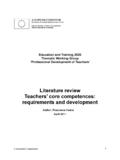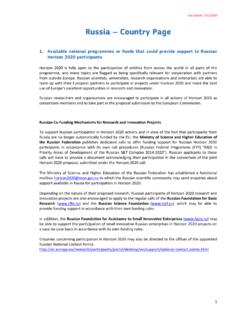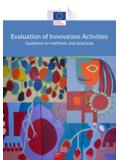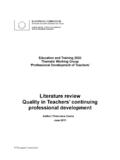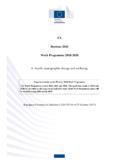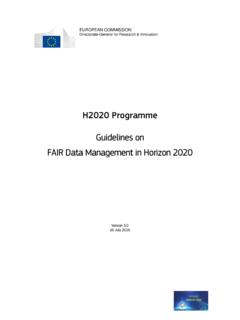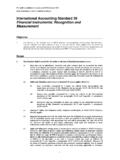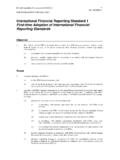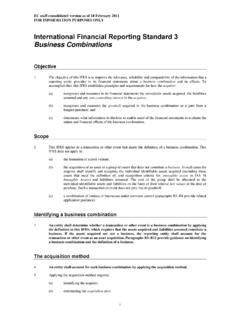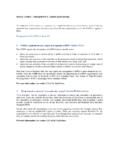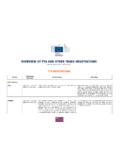Transcription of PARLIAMENT, THE EUROPEAN COUNCIL, THE COUNCIL, THE …
1 EUROPEAN . COMMISSION. Brussels, COM(2022) 133 final COMMUNICATION FROM THE COMMISSION TO THE EUROPEAN . PARLIAMENT, THE EUROPEAN COUNCIL, THE COUNCIL, THE EUROPEAN . ECONOMIC AND SOCIAL COMMITTEE AND THE COMMITTEE OF THE. REGIONS. Safeguarding food security and reinforcing the resilience of food systems EN EN. 1. INTRODUCTION. The unprovoked Russian invasion of Ukraine has further destabilised already fragile agricultural markets. The Covid-19 pandemic and climate change are putting agriculture all over the world under pressure. The latest IPCC report documents how threats to food security and nutrition from droughts, floods and heatwaves as well as sea level rise are already materialising and are set to grow due to global warming, especially affecting vulnerable Already before the invasion, commodity markets were witnessing a significant price surge, which agricultural markets felt through the increases in energy and fertiliser costs, and the consequent increase in farm prices.
2 EU food prices have increased 5,6%. compared to last February. Food supply is not at stake in the EU today. The EU is largely self-sufficient for key agricultural products, being a main wheat and barley exporter and largely able to covers its consumption for other staple crops such as maize or sugar. The EU is also largely self- sufficient for animal products, including dairy and meat, with the notable exception of seafood. However, the invasion of Ukraine and a global commodity price boom are driving up prices in agricultural and seafood product markets and exposing the vulnerabilities of our food system: our dependence on imports of energy, fertiliser and animal feed. This increases costs for producers and affects the price of food, raising concerns as regards the purchasing power of consumers, and the income of producers.
3 The trade disruption also raises serious concerns about global food security stemming from the short-term impact of the war and the longer-term uncertainties that surround it. Dramatic food shortages are being witnessed in besieged Ukrainian cities. Important trade flows of cereals and oilseeds from the Black Sea have practically come to a halt. The war in Ukraine dramatically changed market expectations, affecting prices in all commodities, including for agro-food primary products. The global wheat market is where food security concerns are mainly concentrated. Prices in wheat futures markets have increased by 70% since the invasion. Global wheat output is at risk both from the supply shock stemming from the size of Ukraine's and Russia's share in wheat markets and from the shock in input costs, especially in natural gas, nitrogen fertiliser and oxygen.
4 Up to 25 million tonnes would need to be substituted in order to meet worldwide food needs in the current and the next season2. Now more than ever is the time to demonstrate solidarity. This Communication sets out the Commission response to the invitation of the EUROPEAN Council in its Versailles declaration of 10 and 11 March 2022, to present options to address rising food prices and the issue of global food security. It is based on an assessment of the situation (Annex 1). 1. Climate Change 2022: Impacts, Adaptation and Vulnerability | Climate Change 2022: Impacts, Adaptation and Vulnerability ( ). 2. It is estimated that around 5 million tonnes of wheat cannot be exported by Ukraine until the end of June 2022. Moreover, in the marketing year 2022/2023 a further 20 million tonnes of Ukrainian wheat exports were expected and may not materialise.
5 These figures do not take into account any effects on Russian wheat exports. 1. and builds on its vision for a fair, healthy and environmentally friendly food system laid down in the EUROPEAN Green Deal and its Farm to Fork Strategy. It lays out short term measures to support food security and agriculture in Ukraine, global food security, as well as producers and consumers in the EU. It also calls for addressing the deficiencies revealed by the developing crisis in ways that enhance the transition towards sustainable, resilient and fair food systems in the EU and globally. 2. GLOBAL FOOD SECURITY. The Russian invasion in Ukraine risks having serious consequences for global food security, in Ukraine but also for many food-deficit countries in Africa (including Sub - Saharan Africa), the Middle East, and the Western Balkans.
6 Together with rising food prices, this is likely to increase poverty and instability in these countries. Food security in warn-torn Ukraine is of great concern, particularly as Russia seems to be deliberately targeting and destroying food stocks and storage locations. The UN. Appeal estimates that up to 18 million people will be affected in Ukraine, including up to million who will be newly internally displaced. Food shortages in cities and millions of refugees and displaced persons call for urgent food aid to Ukraine. Humanitarian actors, such as the World Food Programme, are providing food assistance and scaling-up operations. The EU is mobilising aid through both its civil protection and humanitarian mechanisms. EU humanitarian aid, already operational, amounts to EUR 93 million for Ukraine and Moldova including food assistance and support for basic needs.
7 The 2022 harvest in Ukraine, known as the breadbasket of Europe, will be substantially impacted by warfare and general turmoil. Ukrainian farmers need seeds, diesel, fertiliser and plant protection products to ensure production. The Commission is supporting Ukraine to develop and implement a short- and medium-term food security strategy to ensure that inputs reach farms where possible and that transportation and storage facilities are maintained to enable Ukraine to feed its citizens and to eventually regain its export markets. The Commission works with the United Nation's Food and Agriculture Organisation (FAO) on the ground in Western Ukraine to support small farms and secure agricultural production. In addition, on request of the Ukrainian agricultural authorities, the Commission will ensure that access to EU markets is preserved and facilitated in a flexible way both for imports to and exports from Ukrainian markets.
8 The Ukrainian government is planning to finance interest of loans for farmers under a programme worth 25 billion hryvnias (EUR 760 million) as part of a raft of new measures to ease the economic shock of war. And last but not least, EU farming organisations are providing assistance and support to Ukrainian farmers. The war directly affects global food supplies (notably wheat, maize, barley and sunflower oil) and fertiliser prices, as well as energy prices. Current price hikes add to an already difficult socio-economic situation, due to COVID-19, droughts and other conflicts. In September 2021, more than 161 million people in 42 countries were acutely food insecure. Nearly one in three people in the world do not have access to adequate food and for about 3 billion people the costs of a healthy diet were out of reach.
9 These numbers risk rising further and therewith falling further short of reaching the Sustainable Development Goals by 2030. According to initial FAO analysis, the number of undernourished people globally is projected to increase by million people (moderate shock scenario) to million people (severe shock scenario). 2. For many low-income countries and even lower middle-income countries these circumstances imply an increased (food) import bill, at a time when debt has increased and exchange rates are under stress. Countries importing a large part of their food and notably wheat, an important basic commodity, from Russia and Ukraine ( in Africa,the Middle East and the Western Balkans) are heavily impacted and may see growing tensions leading to social unrest, radicalisation and instability.
10 Countries dependent on the import of fertilisers for a significant part of their agricultural production, some of which are also wheat import dependent, will face increasing costs, which may become untenable in a vicious circle, severely threatening food production for the next few harvests. Both humanitarian needs and costs are likely to increase and put additional pressure on humanitarian assistance. For example, the World Food Programme estimates that their operational costs will increase by of EUR million per month compared to current levels, through the combined effect of food and fuel price hikes. When compared to pre- pandemic levels, such additional costs are EUR million per month. The EU, as a major humanitarian and development actor in food and nutrition security, provides substantial financial and political support.
